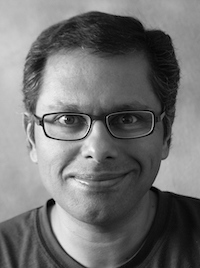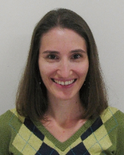Shriram Krishnamurthi
Full Professor at Brown University

Un(der)examined Areas of Program Comprehension for Students
Abstract: A great deal of program comprehension research deals with matters of scale and complexity, because these create difficulties for programmers and therefore deserve support. However, what is difficult is a matter of perception and experience; furthermore, there are many neglected areas of comprehension—especially for students—that are important, difficult, and fascinating. In this talk I will distill several years of research in computing education into three PC’s for this IC: plan comprehension, performance comprehension, and problem comprehension. (With apologies, sometimes the C’s will also refer to construction and composition.)
Bio: Shriram Krishnamurthi is a Professor of Computer Science at Brown University. With collaborators and students, he has created several influential systems and written multiple widely-used books. He also co-directs the Bootstrap integrated computing outreach program. For his work he has received SIGPLAN’s Robin Milner Young Researcher Award, SIGSOFT’s Influential Educator Award, SIGPLAN’s Software Award (jointly), and Brown’s Henry Merritt Wriston Fellowship for distinguished contribution to undergraduate education. He has authored over a dozen papers recognized for honors by program committees. He has an honorary doctorate from the Università della Svizzera Italiana.
Ciera Jaspan
Tech Lead Manager at Google

Using mixed-methods research to study and improve software engineering productivity
Abstract: Software developers continue to be one of the most expensive parts of running a tech company. Understanding how developers work, and why they make certain choices, is critical to measuring and improving their productivity. At Google, we regularly utilize mixed-methods research to understand how developers comprehend their code, how they collaborate, how they spend their time, and what points of frustration they run into along the way. In this presentation, I’ll describe some studies that we’ve run at Google, highlight the methods we frequently utilize, and show how engineering leaders then use the results to make decisions that impact developer productivity.
Bio: Ciera Jaspan is the tech lead manager of Engineering Productivity Research within Developer Infrastructure. The Engineering Productivity Research team brings a data-driven approach to business decisions around engineering productivity. They use a combination of qualitative and quantitative methods to triangulate on measuring productivity. Ciera previously worked on Tricorder, Google’s static analysis platform. She received her B.S. in Software Engineering from Cal Poly and her Ph.D. from Carnegie Mellon, where she worked with Jonathan Aldrich on cost-effective static analysis and software framework design.
Hasan Ayaz
Associate Professor at Drexel University

Neuroergonomics: Towards Ubiquitous and Continuous Measurement of Brain Function during Everyday Life
Abstract: The understanding of the brain functioning and its utilization for real world applications is the next frontier. Existing studies with traditional neuroimaging approaches have accumulated overwhelming knowledge but are limited in scope, i.e. only in artificial lab settings and with simplified parametric tasks. As an interdisciplinary new field, neuroergonomics aims to fill this gap: Understanding the brain in the wild, its activity during unrestricted real-world tasks in everyday life contexts, and its relationship to action, behavior, body, and environment. Functional near infrared spectroscopy (fNIRS), a noninvasive brain monitoring technology that relies on optical techniques to detect changes of cortical hemodynamic responses to human perceptual, cognitive, and motor functioning, is an ideal candidate tool. Ultra-portable wearable and wireless fNIRS sensors are already breaking the limitations of traditional neuroimaging approaches that imposed limitations on experimental protocols, data collection settings and task conditions at the expense of ecological validity. This talk will discuss emerging trends for fNIRS applications, from aerospace to medicine, with diverse populations and towards clinical solutions. We will review recent studies, such as mental workload assessment of specialized operators performing standardized and complex cognitive tasks and development of expertise during practice of complex cognitive and visuomotor tasks (ranging from aircraft piloting and robot control). Various recent synergistic fNIRS applications for human-human and human-machine interaction, interpersonal neural synchronization and brain computer interfaces, highlight the potential use and are ushering the dawn of a new age in applied neuroscience and neuroengineering.
Bio: Dr. Hasan Ayaz is an Associate Professor of Biomedical Engineering (with tenure) and Psychological and Brain Sciences (with courtesy) at Drexel University, an adjunct professor at the University of Pennsylvania and associate fellow at the Children’s Hospital of Philadelphia, and a Provost Solutions Fellow at the Drexel Solutions Institute. He leads the Drexel Neuroergonomics and Neuroengineering Research Core, focusing on understanding human brain function using mobile neuroimaging and physiological biosensing in realistic and real-world environments with complex cognitive tasks, across the lifespan and from healthy (typical to specialized groups) to diverse clinical conditions (mental health to neurological). He is also core faculty at the Cognitive Neuroengineering and Quantitative Experimental Research (CoNQuER) Collaborative (drexel.edu/conquer), a brain observatory that is equipped with state-of-the-art brain and body sensors, as well as electronic design, assembly, and testing facilities for new sensor development.
For close to two decades, he has worked on the development of miniaturized continuous-wave near-infrared spectroscopy systems specialized for neuroimaging. He has developed brain monitoring tools that are routinely utilized for clinical and field research at more than 200 university, government, and corporate labs and has led the software development of the first optical-brain-monitoring medical device, Infrascanner, a portable-handheld instrument that utilizes near-infrared to detect hematoma in head trauma patients, currently deployed in 42 countries/6 continents in both civilian and military hospitals. Dr. Ayaz’s research involves understanding the neural mechanisms related to human cognitive function with a focus on real-world contexts, mobile neuroimaging, and neuroengineering approaches for neuroergonomics applications. He has 85+ journal papers and 200+ book chapters/conference publications with over 6k citations.
Dr. Ayaz is a leading advocate of Neuroergonomics, an emerging field that investigates the human brain function in relation to behavioral performance in natural environments and everyday settings. He has co-founded the Neuroergonomics Conference series and co-chaired the inaugural and the 2nd International Neuroergonomics Conferences (Paris, 2016; Philadelphia, 2018). He has co-edited nine journal special issues, and a comprehensive book on Neuroergonomics with Prof. Frederic Dehais, published by Elsevier. He is also the co-founding Field Chief Editor of the new journal: Frontiers in Neuroergonomics, with an editorial board of over 400 editors/leading scientists from around the world.